北师大版(2019)高中英语选择性必修第四册 Unit 11 Conflict And Compromise Lesson3 精品课件(34张)
文档属性
| 名称 | 北师大版(2019)高中英语选择性必修第四册 Unit 11 Conflict And Compromise Lesson3 精品课件(34张) |
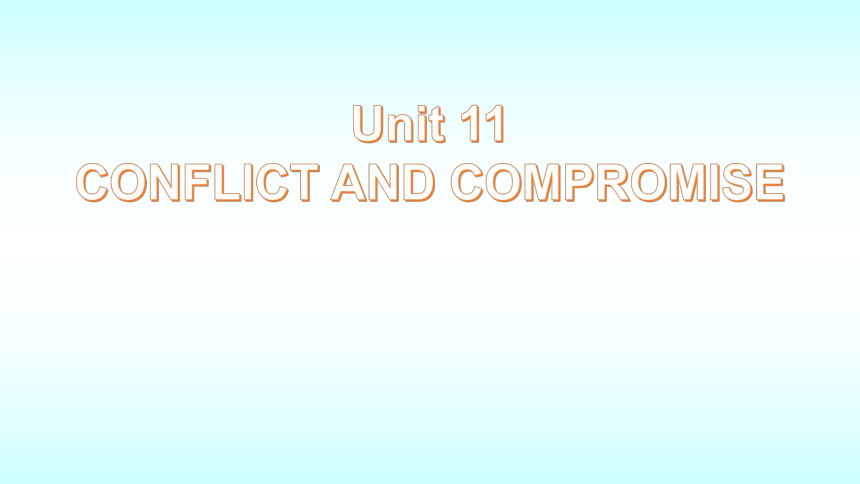
|
|
| 格式 | pptx | ||
| 文件大小 | 3.1MB | ||
| 资源类型 | 教案 | ||
| 版本资源 | 北师大版(2019) | ||
| 科目 | 英语 | ||
| 更新时间 | 2023-03-18 10:30:53 | ||
图片预览

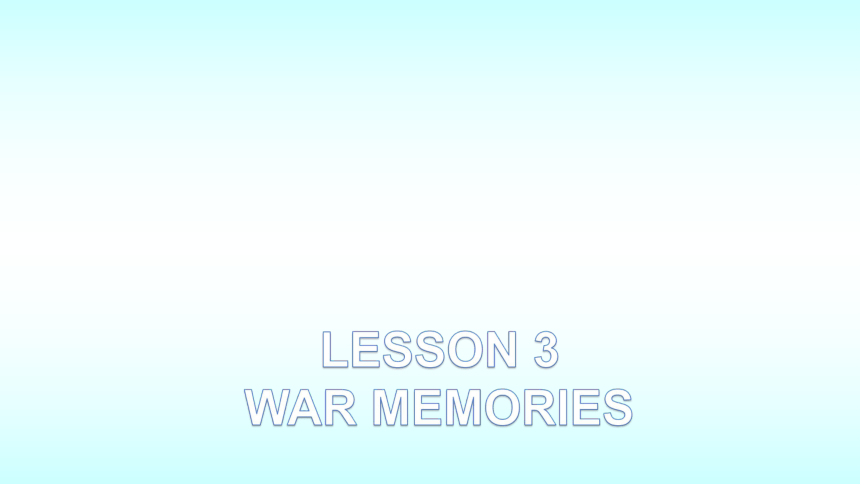
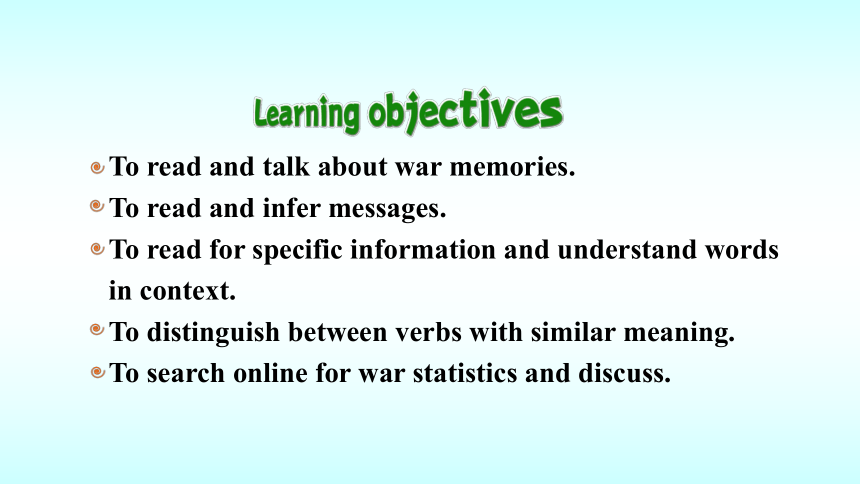
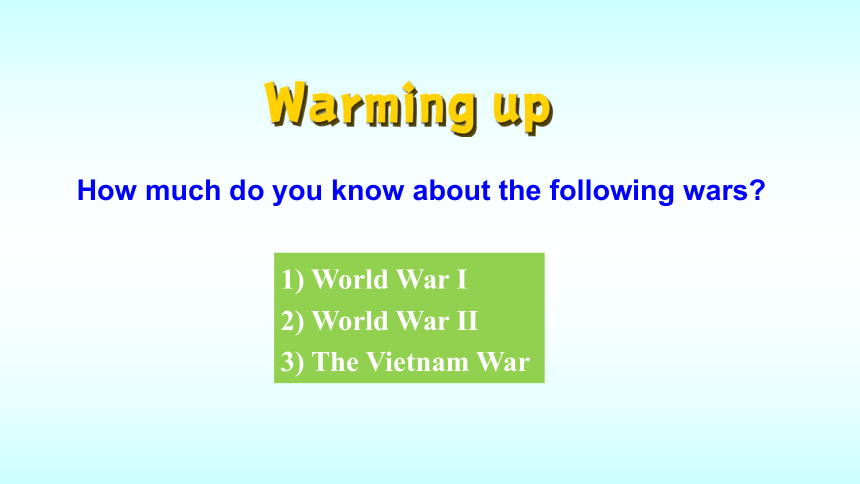
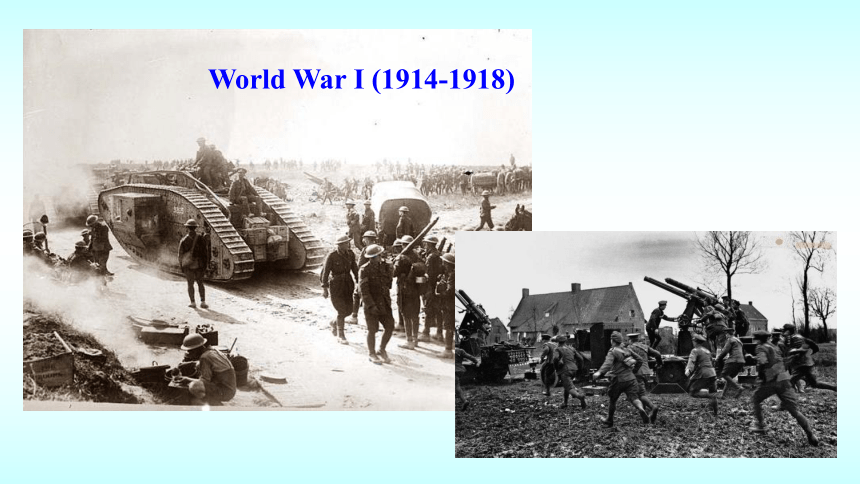
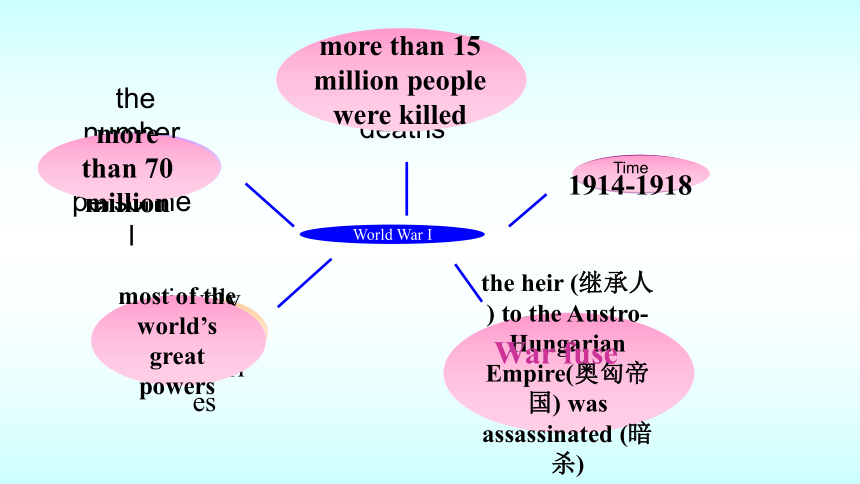

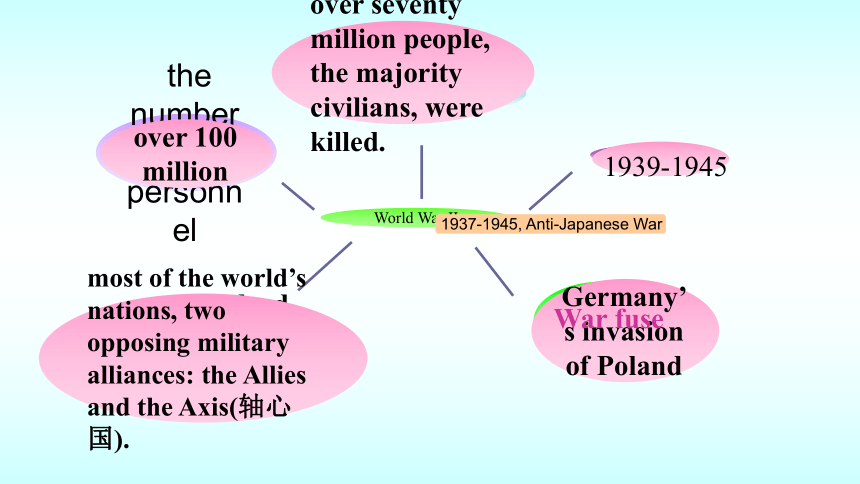
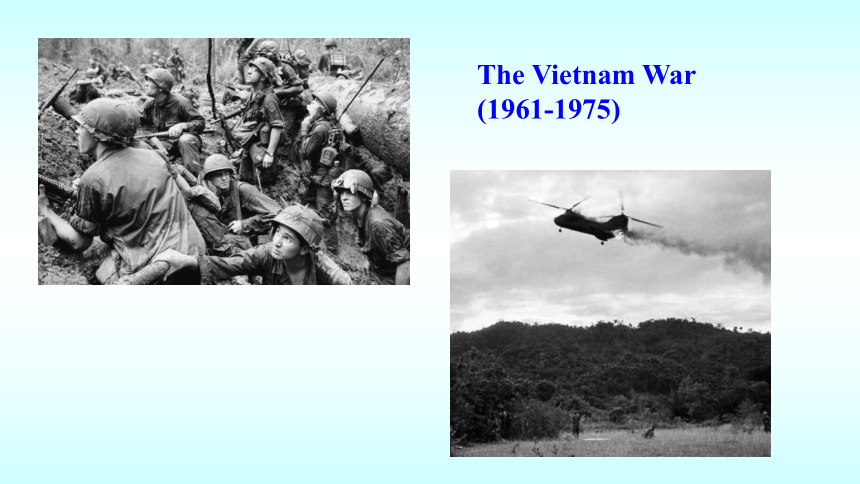
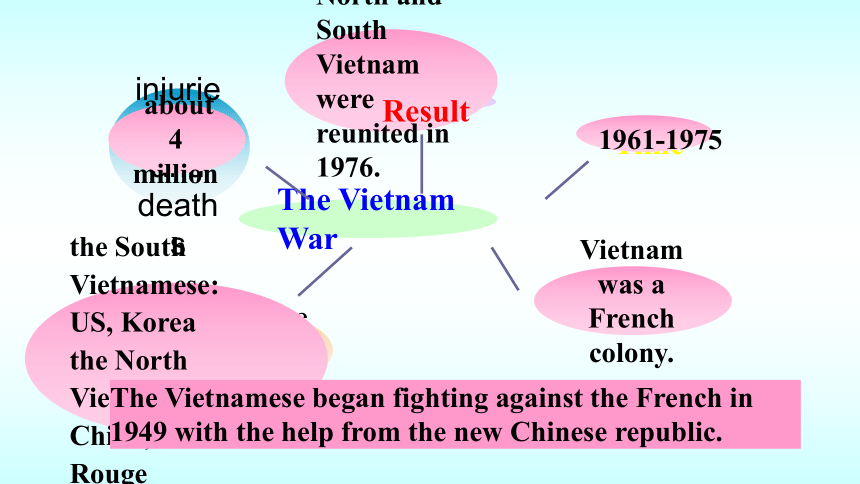
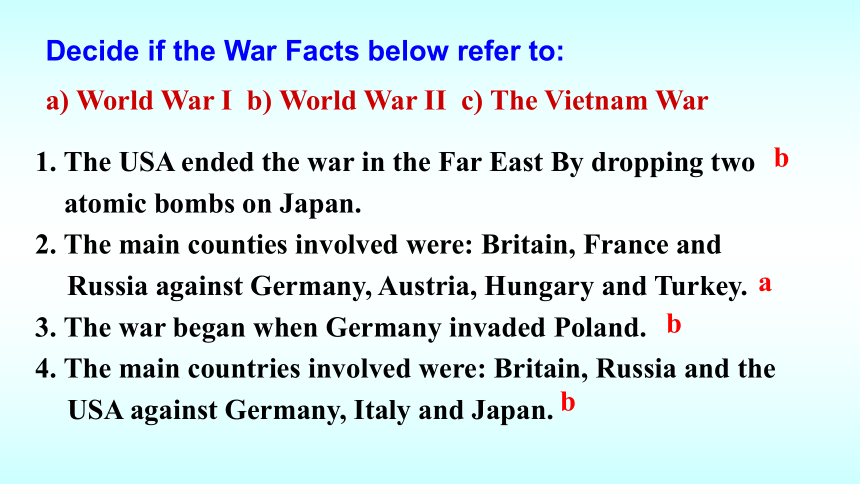
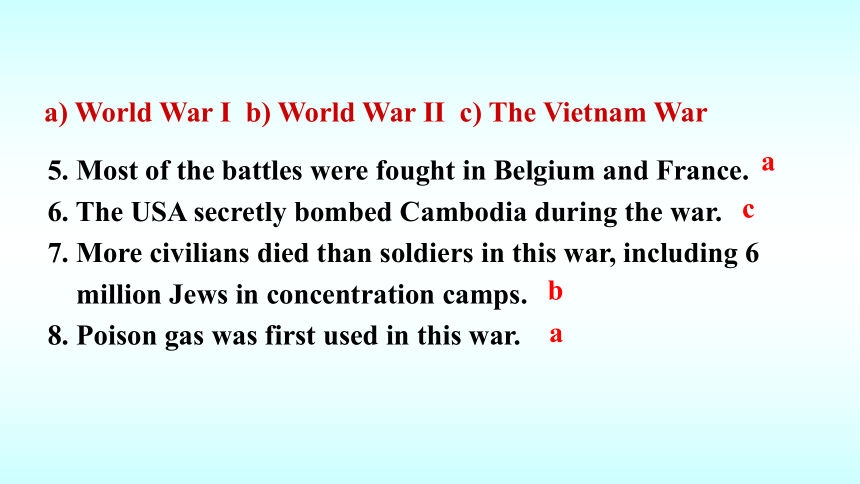
文档简介
(共34张PPT)
Unit 11
CONFLICT AND COMPROMISE
LESSON 3
WAR MEMORIES
To read and talk about war memories.
To read and infer messages.
To read for specific information and understand words in context.
To distinguish between verbs with similar meaning.
To search online for war statistics and discuss.
How much do you know about the following wars
1) World War I
2) World War II
3) The Vietnam War
World War I (1914-1918)
World War Ⅰ
involved
countries
injuries
and deaths
the number
of personnel
more than 70 million
more than 15 million people were killed
most of the world’s great powers
the heir (继承人) to the Austro-Hungarian Empire(奥匈帝国) was assassinated (暗杀)
1914-1918
Time
War fuse
World War II (1939-1945)
World War Ⅱ
involved
countries
injuries
and deaths
the number
of personnel
Time
over 100 million
Germany’s invasion of Poland
most of the world’s nations, two opposing military alliances: the Allies and the Axis(轴心国).
over seventy million people, the majority civilians, were killed.
1939-1945
War fuse
1937-1945, Anti-Japanese War
The Vietnam War
(1961-1975)
The Vietnam War
involved
countries
injuries
and deaths
Time
War fuse
Vietnam was a French colony.
North and South Vietnam were reunited in 1976.
about 4 million
the South Vietnamese:
US, Korea
the North Vietnamese: China, Khmer Rouge
1961-1975
The Vietnamese began fighting against the French in 1949 with the help from the new Chinese republic.
Result
Decide if the War Facts below refer to:
a) World War I b) World War II c) The Vietnam War
1. The USA ended the war in the Far East By dropping two
atomic bombs on Japan.
2. The main counties involved were: Britain, France and Russia against Germany, Austria, Hungary and Turkey.
3. The war began when Germany invaded Poland.
4. The main countries involved were: Britain, Russia and the USA against Germany, Italy and Japan.
b
a
b
b
5. Most of the battles were fought in Belgium and France.
6. The USA secretly bombed Cambodia during the war.
7. More civilians died than soldiers in this war, including 6
million Jews in concentration camps.
8. Poison gas was first used in this war.
a) World War I b) World War II c) The Vietnam War
a
c
b
a
Look at the pictures. Talk about the following questions.
What are the pictures about Who can you see
Why do you think wars start What comes to your mind when talking about wars What can wars lead to Use the words and phrases to help you. Pay attention to the new words in purple.
slavery, oil field, national security, drugs, religion, poverty, corruption, land, power
army, soldier, bomb, mass murder, losing family members, officer, general, trench, destroyed cities and villages, changing borders, enemy, bleeding, frontier, being wounded, fleeing homeland, shooting, firing, dead body, weeping/sobbing/crying, peace
Skim through the three stories about wars.
Whose memories are these
Choose a proper title for each story.
Brave Patient
A Happy Ending
Death of a Village
No More Fighting
War Memories
Story A
Story B
Story C
Listen and read Story A. Record how the farmers’ feelings changed as the events unfolded.
What happened How did he/they feel
Breakfast time Do Chuc’s family were ___________ _______________________________ _______________________________.
At the square All the villagers _____________.
Seeing a machine gun Some villagers ___________________.
Shooting started Do Chuc’s daughters and aunt __________ but he __________.
peaceful
calm, not afraid
surprised, panic
scared, desperate
ordered from their
were told to sit
weeping and praying
were killed
himself fled
homes and marched into the village square together with other villagers
Listen and read Story B. Complete the diagram with phrasal verbs describing what “we”, the British soldiers, and the Germans did.
“we” “the Germans”
In the morning
During the day
Before midnight
On Christmas Day
stuck up a board threw their equipment off; climbed out of the trench; walked through the mud
did the same
spent all day with one another; talked about the war; brought them (beer) over to us; came to an understanding
brought some beer over
decided not to start firing
“we” “the Germans”
On Boxing Day
never fired a shot
the same
seemed to be waiting for the other to set the ball rolling; spent the whole day chatting with them; replaced by other soldiers
shouted across and asked how they had enjoyed the beer
Why do you think the British soldiers were replaced by other soldiers
They were replaced because they didn’t fight. We know that as soldiers, they had to fight though as human beings, they longed for peace.
Listen and read Story C. Answer the questions.
1. What happened in the story Whose memory is it
2. Why was the patient in the hospital
3. Why did the nurse feel turned off when she was told to clean up the ward for some VIPs’ visit
4. Why did the general come to the hospital
5. Why did the soldier throw the watch back at the general
6. Why did the nurse sob and the soldier cry in the end
Skill Builder
Making Inferences
Sometimes messages are not delivered explicitly in the text. You need to make a guess by using clues and logic.
Read the text to get the general idea.
Think about the meaning between the lines by studying the clues.
1. What happened in the story Whose memory is it
A wounded soldier gets an award while in hospital but feels angry. It’s a nurse’s memory.
2. Why was the patient in the hospital
The patient was in the hospital because he had had both his legs blown off.
3. Why did the nurse feel turned off when she was told to clean up the ward for some VIPs’ visit
Because she probably felt that they had to deal with all the problems while army VIPs only came for ceremonies.
4. Why did the general come to the hospital
The general came to the hospital to give an award to a wounded soldier.
5. Why did the soldier throw the watch back at the general
The patient threw the watch because he thought it was not going to help him walk.
6. Why did the nurse sob and the soldier cry in the end
The nurse cried in the end because she admired the patient for what he said and the soldier cried because he felt helpless.
Read the stories again. Complete the summary for each story.
Story A Do Chuc’s family ____________ into the village square, watched the soldiers ________ a machine gun, and then ___________ started.
Story B On Christmas Day, the soldiers on the frontier celebrated Christmas together. They ________________ and __________. They were all ______________ with the war.
Story C The young soldier had both his legs ________. He ___________ a Purple Heart and a watch for being number 20,000 to ____________ the hospital.
were marched
set up
the shooting
greeted each other
shook hands
fed up to the neck
blown off
was awarded
come through
Choose the most touching part of a story. Read it aloud. Then tell your group members what touches you. Support your opinion with quotes from the story.
1. What is the turning point of each story
2. For each story, what war memories did each person have
3. What does the author of each story try to convey
“Turning point” is when something unexpected happens in a story that changes the situation abruptly.
Work in groups of four and discuss the questions, note down your answers.
1. The turning point of each story:
A: The American soldiers set up a machine gun and began to shoot the villagers.
B: Two of our men threw their equipment off and climbed out of the trench with their hands above their heads as representatives. Two of the Germans did the same.
C: The patient threw the watch back at the general.
2. War memories:
A: the person has memories of killing and survival.
B: the person has a memory of an unexpected, peaceful event between soldiers.
C: the person has a memory of the effects of war on a soldier.
3. What does the author of each story try to convey
The authors try to convey the message that war is cruel and hurts everyone, both soldiers and innocent persons.
Search online for statistics about the death and destruction caused by World War II. Discuss the ways in which war causes suffering. What is your opinion on war
Focus on language
Verbs with similar meanings
Put the words in the Word Builder into two groups and explain their difference in usage.
sob chat reply swear greet tell
weep speak shout whisper mention
Verbs with similar meanings
Cry has a similar meaning to: __________
Say has a similar meaning to: ____
sob
chat
weep
reply, swear, greet, whisper, tell, speak, shout, mention
Complete the text by choosing the correct options.
A soldier from World War I tells one of his war memories…
During the war, I had to work on an air base in South Africa. I remember once we had 24 hours off-duty, my friends and I had a night out in the town. We were walking slowly back to the base at about midnight, talking about the evening, when someone mentioned/chatted South Africa’s famous wild animals. We were chatting/swearing about stories we’d heard when suddenly my friend, Bob, begged us to be quiet.
mentioned
chatting
“Be quiet yourself!” somebody greeted/replied. Then I heard them. “No, everyone be quiet,” I whispered/swore. And then we all could hear the lions. “Quick, run!” someone mentioned/ shouted. We all ran towards our base. Everyone made it back except me - I fell into a trench! I stayed there till morning when I climbed out and walked back to the base. My friends
whispered/greeted me like a hero. They thought I’d been eaten! l swore/chatted that I’d never go drinking and then walking in the wild at night again.
replied
whispered
shouted
greeted
swore
Can you list some wars in history which fought for the justice of mankind
Can you think of any wars that were fought for reasons of greed or prejudices
Unit 11
CONFLICT AND COMPROMISE
LESSON 3
WAR MEMORIES
To read and talk about war memories.
To read and infer messages.
To read for specific information and understand words in context.
To distinguish between verbs with similar meaning.
To search online for war statistics and discuss.
How much do you know about the following wars
1) World War I
2) World War II
3) The Vietnam War
World War I (1914-1918)
World War Ⅰ
involved
countries
injuries
and deaths
the number
of personnel
more than 70 million
more than 15 million people were killed
most of the world’s great powers
the heir (继承人) to the Austro-Hungarian Empire(奥匈帝国) was assassinated (暗杀)
1914-1918
Time
War fuse
World War II (1939-1945)
World War Ⅱ
involved
countries
injuries
and deaths
the number
of personnel
Time
over 100 million
Germany’s invasion of Poland
most of the world’s nations, two opposing military alliances: the Allies and the Axis(轴心国).
over seventy million people, the majority civilians, were killed.
1939-1945
War fuse
1937-1945, Anti-Japanese War
The Vietnam War
(1961-1975)
The Vietnam War
involved
countries
injuries
and deaths
Time
War fuse
Vietnam was a French colony.
North and South Vietnam were reunited in 1976.
about 4 million
the South Vietnamese:
US, Korea
the North Vietnamese: China, Khmer Rouge
1961-1975
The Vietnamese began fighting against the French in 1949 with the help from the new Chinese republic.
Result
Decide if the War Facts below refer to:
a) World War I b) World War II c) The Vietnam War
1. The USA ended the war in the Far East By dropping two
atomic bombs on Japan.
2. The main counties involved were: Britain, France and Russia against Germany, Austria, Hungary and Turkey.
3. The war began when Germany invaded Poland.
4. The main countries involved were: Britain, Russia and the USA against Germany, Italy and Japan.
b
a
b
b
5. Most of the battles were fought in Belgium and France.
6. The USA secretly bombed Cambodia during the war.
7. More civilians died than soldiers in this war, including 6
million Jews in concentration camps.
8. Poison gas was first used in this war.
a) World War I b) World War II c) The Vietnam War
a
c
b
a
Look at the pictures. Talk about the following questions.
What are the pictures about Who can you see
Why do you think wars start What comes to your mind when talking about wars What can wars lead to Use the words and phrases to help you. Pay attention to the new words in purple.
slavery, oil field, national security, drugs, religion, poverty, corruption, land, power
army, soldier, bomb, mass murder, losing family members, officer, general, trench, destroyed cities and villages, changing borders, enemy, bleeding, frontier, being wounded, fleeing homeland, shooting, firing, dead body, weeping/sobbing/crying, peace
Skim through the three stories about wars.
Whose memories are these
Choose a proper title for each story.
Brave Patient
A Happy Ending
Death of a Village
No More Fighting
War Memories
Story A
Story B
Story C
Listen and read Story A. Record how the farmers’ feelings changed as the events unfolded.
What happened How did he/they feel
Breakfast time Do Chuc’s family were ___________ _______________________________ _______________________________.
At the square All the villagers _____________.
Seeing a machine gun Some villagers ___________________.
Shooting started Do Chuc’s daughters and aunt __________ but he __________.
peaceful
calm, not afraid
surprised, panic
scared, desperate
ordered from their
were told to sit
weeping and praying
were killed
himself fled
homes and marched into the village square together with other villagers
Listen and read Story B. Complete the diagram with phrasal verbs describing what “we”, the British soldiers, and the Germans did.
“we” “the Germans”
In the morning
During the day
Before midnight
On Christmas Day
stuck up a board threw their equipment off; climbed out of the trench; walked through the mud
did the same
spent all day with one another; talked about the war; brought them (beer) over to us; came to an understanding
brought some beer over
decided not to start firing
“we” “the Germans”
On Boxing Day
never fired a shot
the same
seemed to be waiting for the other to set the ball rolling; spent the whole day chatting with them; replaced by other soldiers
shouted across and asked how they had enjoyed the beer
Why do you think the British soldiers were replaced by other soldiers
They were replaced because they didn’t fight. We know that as soldiers, they had to fight though as human beings, they longed for peace.
Listen and read Story C. Answer the questions.
1. What happened in the story Whose memory is it
2. Why was the patient in the hospital
3. Why did the nurse feel turned off when she was told to clean up the ward for some VIPs’ visit
4. Why did the general come to the hospital
5. Why did the soldier throw the watch back at the general
6. Why did the nurse sob and the soldier cry in the end
Skill Builder
Making Inferences
Sometimes messages are not delivered explicitly in the text. You need to make a guess by using clues and logic.
Read the text to get the general idea.
Think about the meaning between the lines by studying the clues.
1. What happened in the story Whose memory is it
A wounded soldier gets an award while in hospital but feels angry. It’s a nurse’s memory.
2. Why was the patient in the hospital
The patient was in the hospital because he had had both his legs blown off.
3. Why did the nurse feel turned off when she was told to clean up the ward for some VIPs’ visit
Because she probably felt that they had to deal with all the problems while army VIPs only came for ceremonies.
4. Why did the general come to the hospital
The general came to the hospital to give an award to a wounded soldier.
5. Why did the soldier throw the watch back at the general
The patient threw the watch because he thought it was not going to help him walk.
6. Why did the nurse sob and the soldier cry in the end
The nurse cried in the end because she admired the patient for what he said and the soldier cried because he felt helpless.
Read the stories again. Complete the summary for each story.
Story A Do Chuc’s family ____________ into the village square, watched the soldiers ________ a machine gun, and then ___________ started.
Story B On Christmas Day, the soldiers on the frontier celebrated Christmas together. They ________________ and __________. They were all ______________ with the war.
Story C The young soldier had both his legs ________. He ___________ a Purple Heart and a watch for being number 20,000 to ____________ the hospital.
were marched
set up
the shooting
greeted each other
shook hands
fed up to the neck
blown off
was awarded
come through
Choose the most touching part of a story. Read it aloud. Then tell your group members what touches you. Support your opinion with quotes from the story.
1. What is the turning point of each story
2. For each story, what war memories did each person have
3. What does the author of each story try to convey
“Turning point” is when something unexpected happens in a story that changes the situation abruptly.
Work in groups of four and discuss the questions, note down your answers.
1. The turning point of each story:
A: The American soldiers set up a machine gun and began to shoot the villagers.
B: Two of our men threw their equipment off and climbed out of the trench with their hands above their heads as representatives. Two of the Germans did the same.
C: The patient threw the watch back at the general.
2. War memories:
A: the person has memories of killing and survival.
B: the person has a memory of an unexpected, peaceful event between soldiers.
C: the person has a memory of the effects of war on a soldier.
3. What does the author of each story try to convey
The authors try to convey the message that war is cruel and hurts everyone, both soldiers and innocent persons.
Search online for statistics about the death and destruction caused by World War II. Discuss the ways in which war causes suffering. What is your opinion on war
Focus on language
Verbs with similar meanings
Put the words in the Word Builder into two groups and explain their difference in usage.
sob chat reply swear greet tell
weep speak shout whisper mention
Verbs with similar meanings
Cry has a similar meaning to: __________
Say has a similar meaning to: ____
sob
chat
weep
reply, swear, greet, whisper, tell, speak, shout, mention
Complete the text by choosing the correct options.
A soldier from World War I tells one of his war memories…
During the war, I had to work on an air base in South Africa. I remember once we had 24 hours off-duty, my friends and I had a night out in the town. We were walking slowly back to the base at about midnight, talking about the evening, when someone mentioned/chatted South Africa’s famous wild animals. We were chatting/swearing about stories we’d heard when suddenly my friend, Bob, begged us to be quiet.
mentioned
chatting
“Be quiet yourself!” somebody greeted/replied. Then I heard them. “No, everyone be quiet,” I whispered/swore. And then we all could hear the lions. “Quick, run!” someone mentioned/ shouted. We all ran towards our base. Everyone made it back except me - I fell into a trench! I stayed there till morning when I climbed out and walked back to the base. My friends
whispered/greeted me like a hero. They thought I’d been eaten! l swore/chatted that I’d never go drinking and then walking in the wild at night again.
replied
whispered
shouted
greeted
swore
Can you list some wars in history which fought for the justice of mankind
Can you think of any wars that were fought for reasons of greed or prejudices
同课章节目录
- Unit 10 Connections
- Lesson 1 How Closely Connected Are We?
- Lesson 2 Community Spirit
- Lesson 3 Anne of Green Gables
- Unit 11 Conflict And Compromise
- Lesson 1 Living In a Community
- Lesson 2 Dealing with Conflict
- Lesson 3 War Memories
- Unit 12 Innovation
- Lesson 1 Scientific Breakthroughs
- Lesson 2 Aha Moment
- Lesson 3 Stephen Hawking
